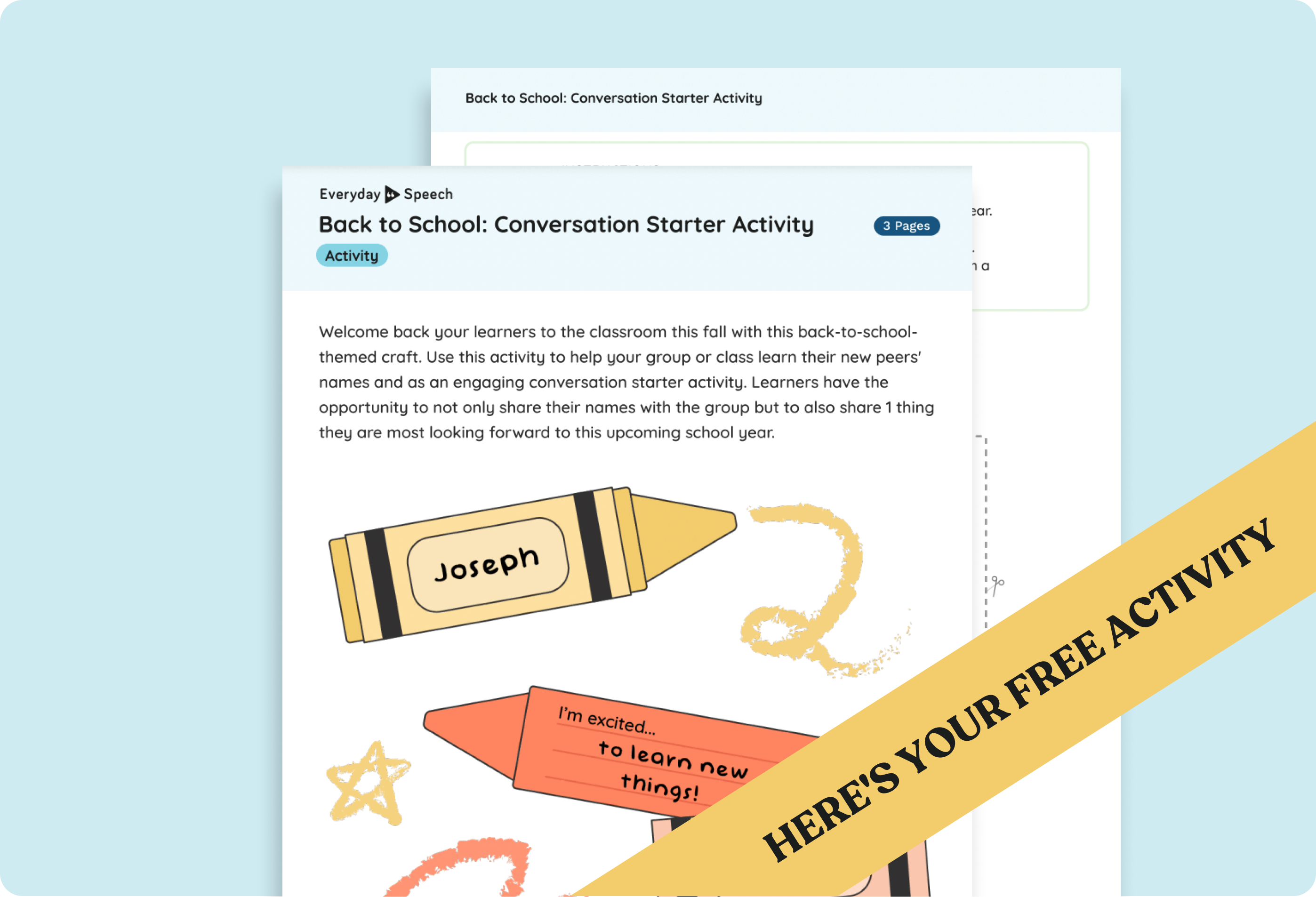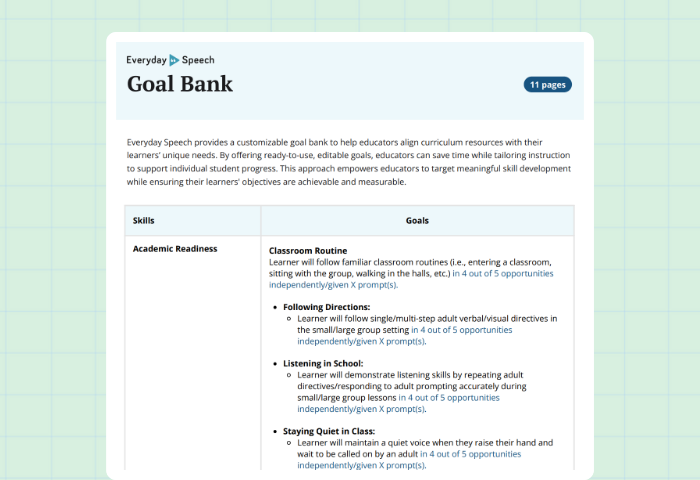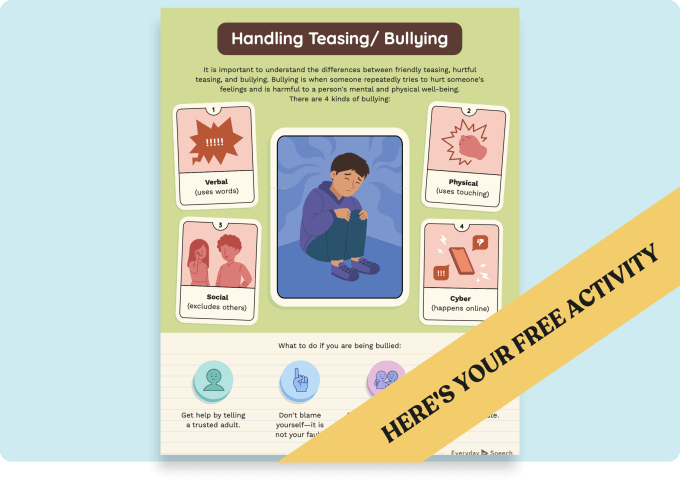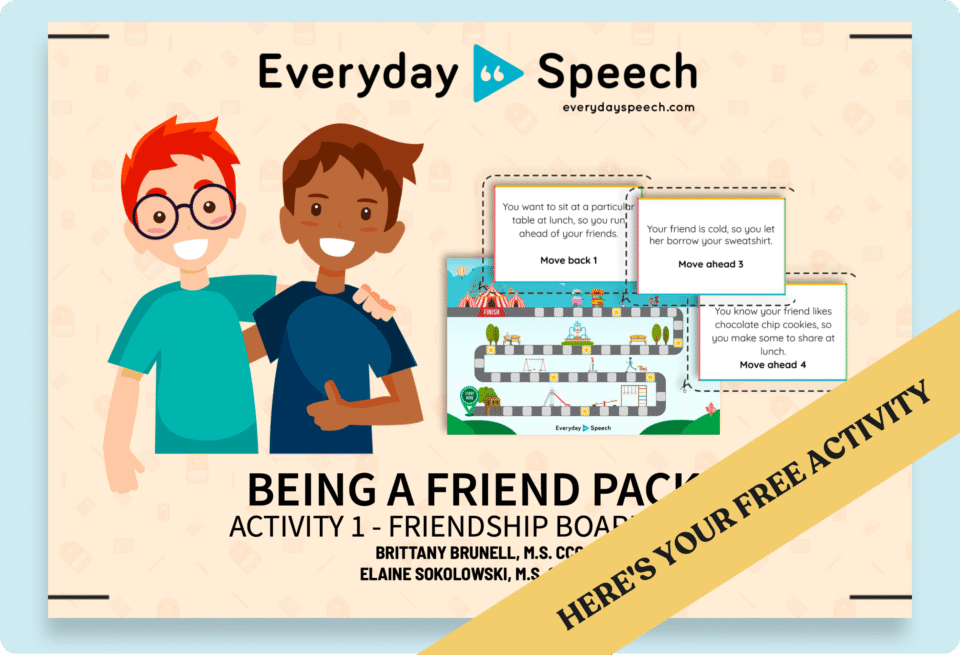Elementary Conversation Skills Activity: Back to School Conversation Starter
Get free social skills materials
No-prep lessons on self-regulation, emotional recognition, conversation skills, and more.
Sign up hereWelcoming students back to school is a pivotal opportunity for clinicians and educators to build social connections and set a positive tone for the year. Establishing foundational conversational skills helps students feel comfortable, create friendships, and engage meaningfully within the classroom environment.
Build Stronger Classrooms with Free Behavior Skills Activities
Download ready-to-use lessons that teach listening, respect, and smooth transitions so students are prepared to learn every day.
A practical tool to jumpstart these skills is the Back to School: Conversation Starter Activity, a no-prep resource from Everyday Speech designed specifically for elementary-aged learners.
What Are Conversation Skills?
Conversation skills refer to the set of behaviors and strategies individuals use to initiate, maintain, and appropriately end interactions with others. These skills include making eye contact, listening actively, taking turns speaking, responding to others, and understanding the social cues that guide conversations. Effective conversation skills are essential for successful peer relationships and learning in the classroom. Specific components of conversation skills include:
- Greeting others appropriately
- Asking and answering questions
- Making relevant comments
- Listening and demonstrating interest in what others say
- Recognizing and respecting personal space
Students who develop solid conversation abilities are better equipped to express themselves, resolve conflicts, and foster a supportive classroom environment. For many children, especially those with social communication challenges, direct teaching and structured practice of these skills are crucial for meaningful participation at school.
Why Teach Conversation Skills?
Conversation skills provide the foundation for nearly every aspect of classroom and social life. Here are key reasons to prioritize instruction on this topic:
- Promote positive peer relationships by teaching respectful turn-taking and active listening.
- Enhance classroom participation as students grow more confident to speak up and share ideas.
- Support emotional well-being by reducing social anxiety and increasing comfort in group settings.
- Foster a sense of belonging and community, particularly during periods of transition such as the start of the school year.
- Build conflict resolution tools, helping students navigate misunderstandings or disagreements.
- Prepare students for academic collaboration through cooperative learning and group projects.
- Facilitate smoother integration for new students, allowing all learners to form supportive connections.
- Address specific challenges faced by students with language, attention, or social communication difficulties.
By explicitly teaching these competencies, clinicians and educators can help prevent isolation, reduce misunderstandings, and give all students the scaffolding they need to thrive socially and academically.
Lesson Plan: Using Back to School: Conversation Starter Activity
Build Stronger Classrooms with Free Behavior Skills Activities
Download ready-to-use lessons that teach listening, respect, and smooth transitions so students are prepared to learn every day.
The Back to School: Conversation Starter Activity (available here) offers a visually engaging and accessible way to launch conversation practice during the first weeks of school. The PDF provides an assortment of question prompts and conversation starters specifically designed for young learners. This low-prep activity is suitable for whole-class, small group, or individual instruction.
Step 1: Preparation and Setting Expectations
Begin by downloading and printing copies of the Conversation Starter Activity from the Everyday Speech resource hub. Review the question cards in advance to ensure they are appropriate for your group and consider laminating them for repeated use throughout the year.
Before starting the activity, clearly explain your expectations for conversation practice. Remind students about positive social behaviors such as listening respectfully, waiting their turn, making eye contact, and using friendly voices. You may wish to co-create anchor charts with visuals highlighting key conversational cues, so students have a reference during the activity.
Step 2: Introducing the Purpose and Modeling
Explain to students that the goal of the activity is to help everyone get to know each other and practice talking and listening in pairs or small groups. Discuss why conversation skills are important, using language and examples appropriate for elementary students. For example, highlight how conversations help people feel included, become friends, and learn new things about each other.
Next, model a short conversation using one of the prompt cards. Select a co-facilitator (teacher, paraprofessional, or student) and demonstrate introducing oneself, taking turns, and responding to a simple question such as, “What is your favorite thing to do at recess?” Make mistakes on purpose, such as interrupting or not making eye contact, and prompt students to identify what should be done differently. Reinforce expected behaviors by highlighting these corrections.
Step 3: Grouping and Distributing the Conversation Starters
Depending on class size and student needs, organize learners into pairs or small groups of three to four. Give each group a set of conversation starter cards, or, if working with a whole class, use the cards one at a time in a circle format. If appropriate, assign roles such as Speaker, Listener, and Observer to scaffold turn-taking and ensure everyone is actively engaged.
Provide initial prompts for students to read aloud and answer. The Back to School: Conversation Starter Activity includes a variety of questions, such as:
- What is your favorite book or movie?
- Tell about a pet or animal you like.
- What do you like most about school?
- Who is someone you look up to, and why?
Encourage students to elaborate on their answers and ask follow-up questions to keep the conversation going.
Step 4: Facilitating and Coaches Conversation Practice
Move between groups to offer feedback and gentle coaching as students practice. Remind students to use the conversational cues posted earlier, such as eye contact, body orientation, and listening for understanding. Offer positive reinforcement when you observe effective conversation behaviors.
If students struggle to respond or keep the conversation moving, provide sentence starters or suggest alternative ways to phrase questions. If some learners are shy or reluctant, offer praise for participation and provide additional encouragement.
For groups with emerging language skills or communication challenges, model responses and supply vocabulary as needed. Visually support the conversation by using gestures or pictures for nonreaders or multilingual students.
Step 5: Reflecting and Reinforcing
Conclude the activity with a group reflection. Invite students to share which questions were the most fun, what they learned about their classmates, and what strategies helped them listen or share effectively. This reflection helps reinforce the skills practiced and gives insight into which students may need further support.
Consider displaying a bulletin board of conversation starters in the classroom or providing a weekly prompt to keep conversation skills fresh throughout the year.
Supporting Conversation Skills After the Activity
Continued reinforcement is critical to help students generalize conversational skills beyond structured activities. Here are several ways to encourage ongoing practice and integration:
- Incorporate daily or weekly conversation routines, such as morning meetings, pair-share check-ins, or buddy reading times.
- Use visuals and cues posted in the classroom as reminders for respectful discourse.
- Provide opportunities for informal conversations, allowing students to chat during transitions, lunchtime, or play.
- Offer social scripts, role plays, and additional structured activities for students who need more practice.
- Collaborate with families by sending home conversation prompts or suggestions for dinnertime discussions.
- Partner with classroom teachers or paraprofessionals to reinforce skills in different settings and ensure consistency.
- Track progress using observational checklists or student self-assessments to identify growth and areas needing further development.
Integrating conversation skills across the school day and involving all staff helps normalize positive communication and builds a respectful, inclusive atmosphere for every student.
Wrapping Up: Building Lasting Connections Through Conversation
Beginning the school year with intentional conversation practice signals to students that their voices matter and that social connection is a core value at school. Structured activities such as the Back to School: Conversation Starter Activity provide an accessible, engaging framework to help even reluctant communicators build confidence and competence. When clinicians and educators deliberately nurture these skills—and follow up with ongoing practice and encouragement—students are empowered to build friendships, resolve small conflicts, and actively participate in the classroom community.
By using practical tools and routines, it becomes possible to foster an environment where every student has the chance to learn, share, and connect. The skills modeled and reinforced through conversation starters will serve as foundational building blocks for a successful and socially enriching year. For those interested, the full activity can be downloaded here.





